- Home
- Tamara Leigh
Dreamspell Page 2
Dreamspell Read online
Page 2
“You don’t have a say in it.”
“But you’re my patient. I can’t—”
“You think I like living in this thing?” He gripped the arms of his wheelchair. “When I lost my legs, I lost everything—my wife, my boys, my career. All I do is take up space, and I’m tired of it. You have no idea what it’s like.”
Didn’t she? Her world was crumbling, and though she had no choice as to whether tomorrow came, he did.
His gaze swept to her cap, and he muttered a curse. “I’m sorry, Ken.”
She crossed the observation room and stared through the window at the monitoring equipment.
“How’s the chemo going?”
She tossed her head and achingly acknowledged how much she missed the weight of her hair. “It’s going well.” A lie. There had been progress early on, but the tumor was gaining ground.
“The truth, Ken,” he turned her own words against her.
She swung around. “This isn’t about me.”
“You’re wrong.” He wheeled toward her. “My dream is a way out of the hell I’m living. And it could be yours.”
Nuts. Positively nuts.
He rolled to a halt. “Not my dream, of course. Something of your own choosing.”
Pound. Pound. Pound. She stepped around him. “I need to take something for this headache.”
“You think I’m crazy.”
She looked over her shoulder. “I’ll be back in a few minutes, and we’ll discuss this some more.”
After a long moment, he said, “Sure. Can I borrow your pen?”
She tossed it to him and steered a course to the washroom where she gulped down the pills prescribed for just such reminders of her tumor.
Though she rarely did more than glance in the mirror, she searched her features: sunken eyes, ashen skin, pinched mouth, the hollows beneath her cheeks evidence of her twenty-pound weight loss. As for the hair sweeping her brow, it and the knit cap to which the strands were attached was a gift from her well-meaning mother. She looked almost as bad as Mac, far from the green-eyed “looker” she had been called before. . .
Almost wishing she was as crazy as Mac, she hurried to her office. After being reassured two orderlies were on their way, she returned to the sleep room. It was empty. “No.” She groaned. “Don’t do this, Mac.”
She ran down the corridor, through the reception area, and out the glass doors into the balm of a Los Angeles summer night, but there was no sign of Mac or the cab that had delivered him to the clinic. Where had he gone? It would be a place where no one knew him, where he wouldn’t be bothered if he didn’t show his face for days. Unfortunately, the possibilities could run into the thousands.
What about the cab? If she could find the company he had used, perhaps she could discover where they had taken him.
She went back inside and, in the sleep room, saw the pen Mac had borrowed on the bedside table, beneath it his book. He had forgotten it. Or had he?
She opened The Sins of the Earl of Sinwell. If not that she recognized Mac’s handwriting, she would have flipped past the inscription on the inside cover. She slid her glasses on. Ken, it read, think of this as a postcard. Your friend, Mac
“Oh, Mac.” Try though she might, she knew that if she found him it would be too late. But knowing it and accepting it were two different things. Keeping an eye closed against the pain hammering at her head, she tucked the book under an arm and hurried to her office.
CHAPTER TWO
A way out.
Mac’s words of a month ago whispered to Kennedy as she stared at the reflection of a woman she recognized less each day. Radiation and chemotherapy had taken the last of her hair. And for what? The hope she could beat unbeatable odds. Four weeks, eight at the outside, Kennedy Plain, twenty-eight years young, would go out with a whimper.
“A way out,” she muttered. “Crazy Mac.”
She tightened the belt of her robe and crossed her living room to the glass doors of her condo. A quarter mile out, waves battered the rocky beach, swept sand in and dragged it out again. Stepping onto the balcony, she sighed as cool morning air caressed her bare scalp. It was just what she needed to get through another waking hour. How many was she up to? She glanced at her watch. Seventy-two, meaning it was Monday.
Since forced to take medical leave two weeks ago, she had found it increasingly difficult to track her days—until this past Friday when she began marking time by the hour.
She turned back inside. The journal lay on her desk on a pile of paperwork that represented eighteen months of research. Research that would molder in some forgotten closet if the clinic director had his way. But she wouldn’t let that happen. If it killed her—ha!—she would conclude her study with data culled from her own dream experiences.
She dropped into the desk chair and reached for the journal. It would be her fourth entry, likely the last before her self-imposed sleep deprivation compelled her to sleep. With a quaking hand, she wrote:
8:25 a.m. Seventy-two waking hours. Not sure I can make it to ninety-six. Hands trembling, eyes burning, headache worsening, nauseated. No hallucinations, some memory lapses. Can’t stop thinking about Mac.
She lifted the pen and recalled the night he had borrowed it. For four days she had clung to the hope he lived, but on the fifth day, his lifeless body was found in an abandoned warehouse.
Kennedy swallowed hard. “Wherever you are, I pray you’ve finally found peace.” She rested her forehead in her hand and squeezed her eyes closed. Like a thief, sleep reached for her.
She jumped up and steadied herself with a hand on the chair. “Twenty-four hours,” she murmured. Could she do it? Her chronic insomnia having never exceeded sixty, she was ahead by twelve, but another twenty-four?
What she needed was a good book. Unfortunately, as her library consisted mostly of textbooks and periodicals, the best she could do was The Sins of the Earl of Sinwell. She eyed it where it lay on the sofa table. It had to be less dry than her other choices.
Sliding on her glasses, she retrieved the book and fingered the ridges and recesses of the worn title, then opened past Mac’s inscription to the first chapter. “1373,” she read aloud as she began to walk the room.
An hour later, she gave up. Not because the reading was dry, but her comprehension was nearly nil. One thing was clear from the little she had learned about Fulke Wynland, the Earl of Sinwell: he had no conscience. Not only was he suspected of having a hand in the accident that killed his brother, the Earl of Sinwell, but as a military advisor during the “Hundred Years War,” he had been party to the atrocious massacre of men, women, and children following a siege on the city of Limoges. So what chance had two little boys, aged four and six?
She trudged into the kitchen, opened the freezer, and stuck her face into it. Frigid air returning her to wakefulness, she congratulated herself on that bit of genius and closed the door. “And caffeine will do it one better,” she murmured.
After the coffee maker sputtered its last, putting an exclamation mark on the smell of freshly brewed coffee, Kennedy carried the pot to her cup with a hand that shook so violently that nearly as much made it on the counter as in the cup. When the caffeine kicked in on her third serving, she reached for Mac’s book.
The seventh chapter, marked by a slip of paper, held a scant introduction to Sir Arthur Crosley. Then came the mysterious Lady Lark and a color illustration of the type of clothing a fourteenth-century lady might wear—a pale yellow gown with fitted bodice and long flowing sleeves, a hair veil secured by a tiara set with red and blue jewels, and flat-soled shoes with ridiculously long toes.
Kennedy returned to the text. According to the author, Lady Lark made her first appearance at King Edward III’s court in 1372. No one knew where she came from, her surname, age, or whether she was of the nobility. The only thing for certain was that the king wasted no time numbering her among his mistresses.
During the summer of 1373, two months after appointing Sir Arthur Crosley
to watch over the Wynland boys, King Edward dispatched Lady Lark to Sinwell to care for the motherless children. Though it was suggested his other mistress, the ambitious Alice Perrers, had worked her influence over Edward in order to rid herself of a rival, the author was more given to the belief that the king had simply tired of Lady Lark.
Kennedy trudged past the sofa, pushed her glasses up, and rubbed her eyes. She resettled the glasses.
On the approach to the castle of Brynwood Spire where the boys resided, Lady Lark’s baggage train was attacked and her entourage murdered. Of the lady herself, no trace was ever found. The one responsible for the carnage: Fulke Wynland, the author suggested. Sir Arthur Crosley, fearing for the boys’ lives, spirited them away that very day. . .
Kennedy didn’t recall reading this particular passage at the clinic, and there was no slip of paper to mark its reference to Sir Arthur. Likely, Mac had lost the marker without realizing it. However, when she dug further into the book, she found three other unmarked references. Odd, especially as they were more significant than the ones Mac had asked her to read. But nothing compared to the final reference near the end of the book. She read it twice. Hadn’t Sir Arthur disappeared at book’s end? Not according to this passage that stated that, following two weeks of pursuit, Wynland overtook him. Swords were drawn and the knight’s life severed by the man who would be earl.
Of course, it was a month since she had read the passages. Was that it? Or was she delusional? She shrugged off the niggling at the back of her mind and, a short while later, slammed the book on Wynland’s ascension to “earl” following the deaths of his nephews in a fire of unknown origin.
“Murderer,” she muttered. And caught her toe on the sofa table. The book flew from her hand and landed on the floor at about the same time she did. It should have hurt, but she was too numb to feel anything but relief at gaining a prone position.
Get up, walk it off. Only ten hours to go. She forced her head up. Seeing the book had fallen open to Mac’s inscription, she pulled it toward her, read his scrawled inscription, and pressed her forehead to the carpet. “A postcard, Mac?”
Don’t close your eyes. But she was too busy melting into the carpet to give more than a glancing thought to hooking herself up to the EEG she had borrowed from the clinic. Sleep descended, scattering her thoughts here, there, everywhere—until they met the enigmatic Lady Lark.
What would it have been like to live in an era of knights and castles? To have been of the privileged class? To dress in gowns with beautiful bodices and long flowing sleeves? To be the mistress of a mighty king? To travel across country in a baggage train with an entourage? Imagine that. . .
The sweet smell of earth, the breath of a breeze, a gentle tapping against her cheek. Wondering who disturbed her, Kennedy opened her eyes. Not who, but what. She stared through the hair fluttering across her face—thick, dark, sprung with wave, the likes of which she hadn’t seen in a long time. A tremor of expectation swept her, but she let it go no further.
This was a dream. When she awakened, not a single strand would remain. She fingered the darkness and lingeringly pushed it out of her eyes. There was something silken at her forehead and, above that, a metal band encircled her head. She drew the former forward and stared at what appeared to be a veil.
A moan sounded from somewhere nearby, and she pushed the veil aside. Only then, with a forest spread before her, did she realize she was prostrate. Where had her dreaming taken her to this time? And what was the vibration beneath her cheek?
She rolled onto her back and stared up at a canopy of trees. It was beautiful the way the sunlight pierced the leaves, thrusting shafts of light into a place that might otherwise appear sinister. There was the twitter of birds and, somewhere, the babble of a brook. It was vibrant, as if—
A mordant scent struck her, causing the dream to veer in a direction she preferred it didn’t go. She sat up and caught her breath. Twenty or more feet out, the bodies of a dozen men were gored and grotesquely bent, most conspicuously two draped across an overturned wagon. And there was more. She felt it, feared it, tried to ignore it, but looked around. Behind her lay a horse, its teeth bared in death, its rider pinned beneath, the man’s chest sliced open and his arm nearly severed.
Kennedy clenched her teeth and lowered her gaze to where the blood of beast and man pooled on the ground. It spread outward, running in rivulets toward her. Nausea rose as she followed its path to the skirt of her dress. Knee to ankle, crimson saturated the pale yellow fabric, causing it to adhere to her skin.
Not a dream. A nightmare.
She scrambled to her feet.
“My lady?” someone croaked.
Kennedy forced herself to look among the bodies. Had she ever before had such a vivid dream? Swallowing hard, she settled her gaze on the man beneath the horse who stared at her through half-hooded eyes.
“My lady. . .are you. . .?” He reached with his uninjured arm.
She knew she ought to flee before her imagination transformed him into something more heinous, but she couldn’t turn her back on him. Too, this was only a dream. Though it might cause her to awaken in a cold sweat, that was the worst she would suffer.
When she dropped to her knees beside the man, she saw that, though he had closed his eyes, his wheezing chest told he still lived.
“What can I do?” she asked.
“I saw the miscreant’s. . .device.” His thick accent sounded almost British.
“Device?”
“Had his medallion. . .in my hand.” He spread his empty fingers. “Upon it a wyvern. . .two-headed. . .above a shield. . .bend sinister.”
“I’m sorry, I don’t understand.”
He lifted his lids. His eyes, pinpoints of pain, traced her face. “You are not my lady.”
“No, I—”
He caught hold of her arm. “What have you done with her?”
For a man about to die, he exhibited incredible strength. “I don’t know what you’re talking about.”
He dragged her toward him, affording her a close-up of his death mask. “You come to steal from the dead,” he spat, flecking her with saliva.
A more morbid dream Kennedy could not recall. She wrenched backward and broke free, but not before he tore the veil from her hair.
She shot to her feet and nearly tripped over her hem. Why was the dress so long? And why was she wearing something like this in the middle of a forest?
Once more, she felt the vibration through the ground. It was stronger. Nearer. Horses? From which direction?
She whipped her head to the side and the breeze caught her hair, sifting it across her face and into her eyes. Though she longed to pause and relish the feel of it, something bad was coming.
It’s only a dream. Stay put and get it over with, and you’ll be awake in no time. But she couldn’t. Heart pounding, she gathered her hair high at the back of her head, knotted it, and hiked up her skirt.
As in the days before her illness, she sped across the ground, vaulted over debris and fallen trees, and nearly forgot the reason she ran. She thrilled to the rush of blood and tightening of her lungs, the strength in her calves and thighs. The only thing missing was a decent pair of running shoes.
When a shout resounded through the trees, she glanced over her shoulder. A horse and rider bore down on her. She pumped her legs harder, but she was no match for the four-legged beast that drew so near she could hear its breath.
Wake up! she silently called to where she lay sleeping. Open your eyes! Though a thread of consciousness often allowed her to talk her way out of disturbing dreams, her pleas went unanswered. Thus, she veered right, seized a branch from the ground, and whirled around.
Her pursuer reined in his horse, scattering leaves and dirt, and guided the animal sideways to look down at her. Clad in metal neck to toe—a jangling, clanking get-up that sounded with each quiver of his horse—he stared at her out of eyes so blue she knew her imagination was in overdrive. Though her dream had n
eglected to place a helmet on his head, it had made sure there was a sword at his side.
Only a dream. He can cut you in two and you’ll awaken whole. At least, as whole as a person with a death sentence hanging over her head. . .
“You do not need that.” His voice was deep and accented, though of a more precise nature than the dying man who had mistaken her for his lady. “You have naught to fear from me.”
Of course she didn’t. He was only a figment, though from where he had originated she had no idea. But with those cheekbones, shoulder-length blond hair, and closely clipped beard and moustache, he was likely a belly-button-bearing model from a billboard she passed on her way to the university.
“Lady Lark?”
She blinked, then nearly laughed at the realization she had dreamed herself into the mysterious lady of Mac’s book. What was the year? 1373? As for this behemoth, was he Fulke Wynland? He had to be. Forget that he was blonde rather than darkly sinister as she had imagined, that his eyes were blue, rather than bottomless black. He was surely the one responsible for the carnage to which she had awakened, not to mention the death of his nephews and the disappearance of the king’s mistress—the same woman he mistook her for.
She jabbed the branch at him in hopes it would send horse and rider back to wherever they had come from.
The animal rolled its huge eyes, reminding her of the one time she had ridden a horse, a mistake that culminated in her missing a barbed wire fence by inches.
“I am Lord Wynland of Brynwood Spire.”
And beneath his armor he probably wore a medallion with a two-headed—what was it? Wyvern? “Stay back!”
“I am King Edward’s man. Be assured, no harm will befall you.”
She swung the branch. “I’ll brain you!”
He frowned deeply, as if her words were foreign, as if her subconscious had not formed him from the pages of an old book. “After what you have seen, my lady, ’tis natural you would suffer hysterics.”
“Oh, puh-lease!”

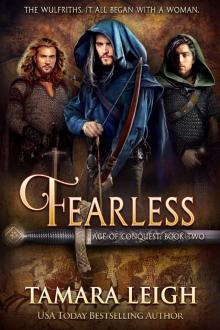 FEARLESS: Book Two: Age of Conquest
FEARLESS: Book Two: Age of Conquest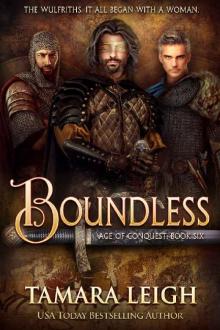 BOUNDLESS: A Medieval Romance (AGE OF CONQUEST Book 6)
BOUNDLESS: A Medieval Romance (AGE OF CONQUEST Book 6)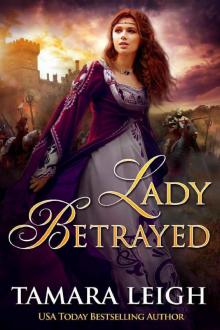 Lady Betrayed
Lady Betrayed Merciless
Merciless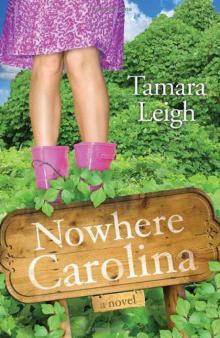 Nowhere, Carolina
Nowhere, Carolina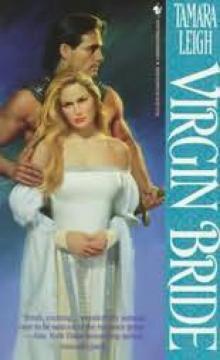 Virgin Bride
Virgin Bride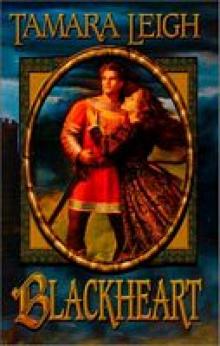 Blackheart
Blackheart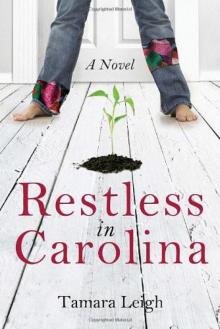 Restless in Carolina
Restless in Carolina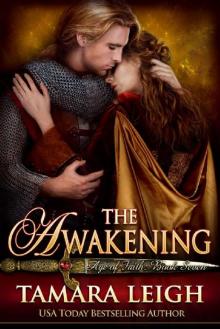 THE AWAKENING_A Medieval Romance
THE AWAKENING_A Medieval Romance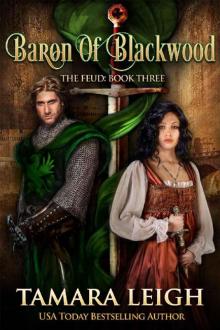 Baron of Blackwood
Baron of Blackwood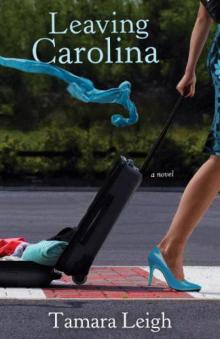 Leaving Carolina
Leaving Carolina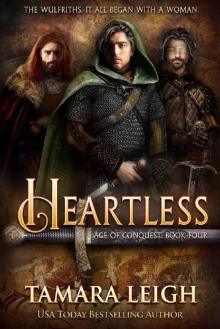 HEARTLESS: A Medieval Romance (Age of Conquest Book 4)
HEARTLESS: A Medieval Romance (Age of Conquest Book 4)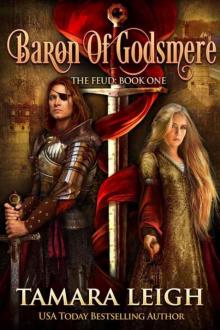 Baron of Godsmere
Baron of Godsmere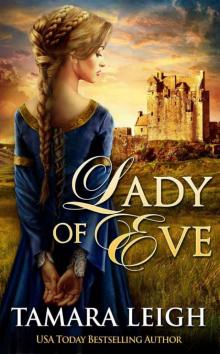 Lady Of Eve
Lady Of Eve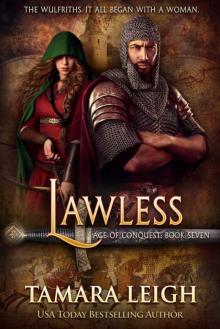 LAWLESS: A Medieval Romance (AGE OF CONQUEST Book 7)
LAWLESS: A Medieval Romance (AGE OF CONQUEST Book 7)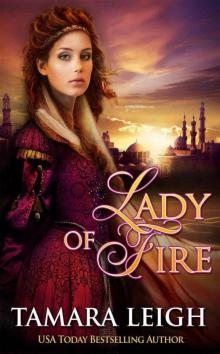 Lady Of Fire AKA Pagan Bride
Lady Of Fire AKA Pagan Bride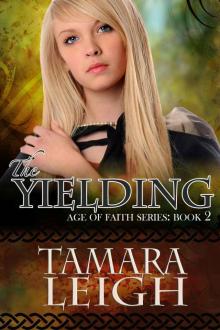 The Yielding (Age of Faith)
The Yielding (Age of Faith)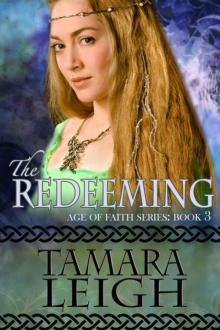 The Redeeming: Book Three (Age of Faith)
The Redeeming: Book Three (Age of Faith)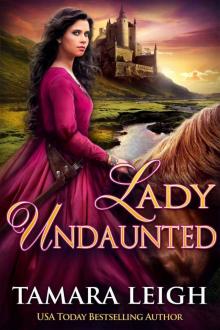 LADY UNDAUNTED: A Medieval Romance
LADY UNDAUNTED: A Medieval Romance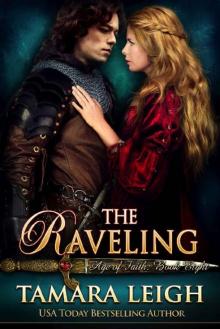 THE RAVELING: A Medieval Romance (Age of Faith Book 8)
THE RAVELING: A Medieval Romance (Age of Faith Book 8)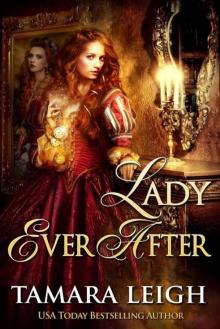 LADY EVER AFTER: A Medieval Time Travel Romance (Beyond Time Book 2)
LADY EVER AFTER: A Medieval Time Travel Romance (Beyond Time Book 2)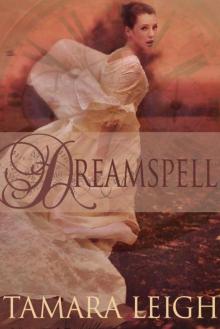 Dreamspell
Dreamspell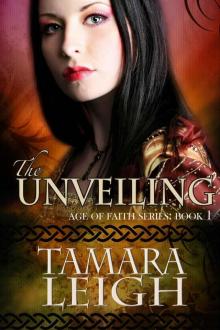 The Unveiling (Age of Faith)
The Unveiling (Age of Faith)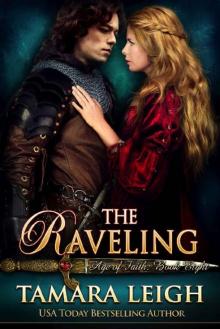 THE RAVELING
THE RAVELING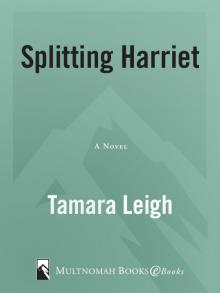 Splitting Harriet
Splitting Harriet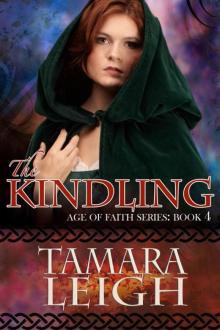 Age of Faith 4 - The Kindling
Age of Faith 4 - The Kindling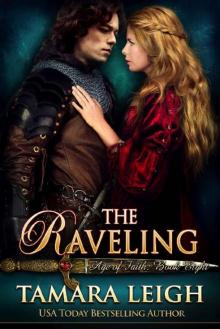 THE RAVELING_A Medieval Romance
THE RAVELING_A Medieval Romance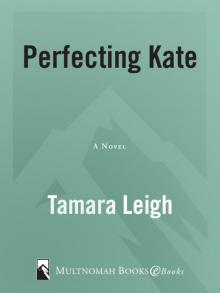 Perfecting Kate
Perfecting Kate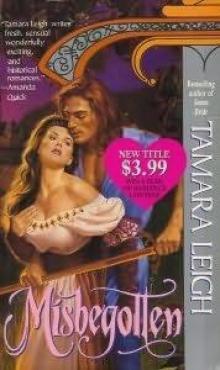 Misbegotten
Misbegotten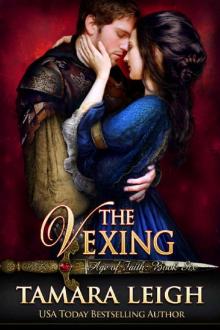 THE VEXING: A Medieval Romance (AGE OF FAITH Book 6)
THE VEXING: A Medieval Romance (AGE OF FAITH Book 6)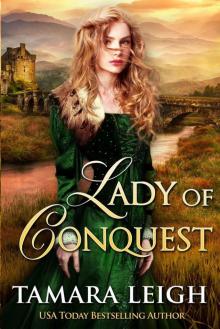 LadyOfConquest:SaxonBride
LadyOfConquest:SaxonBride